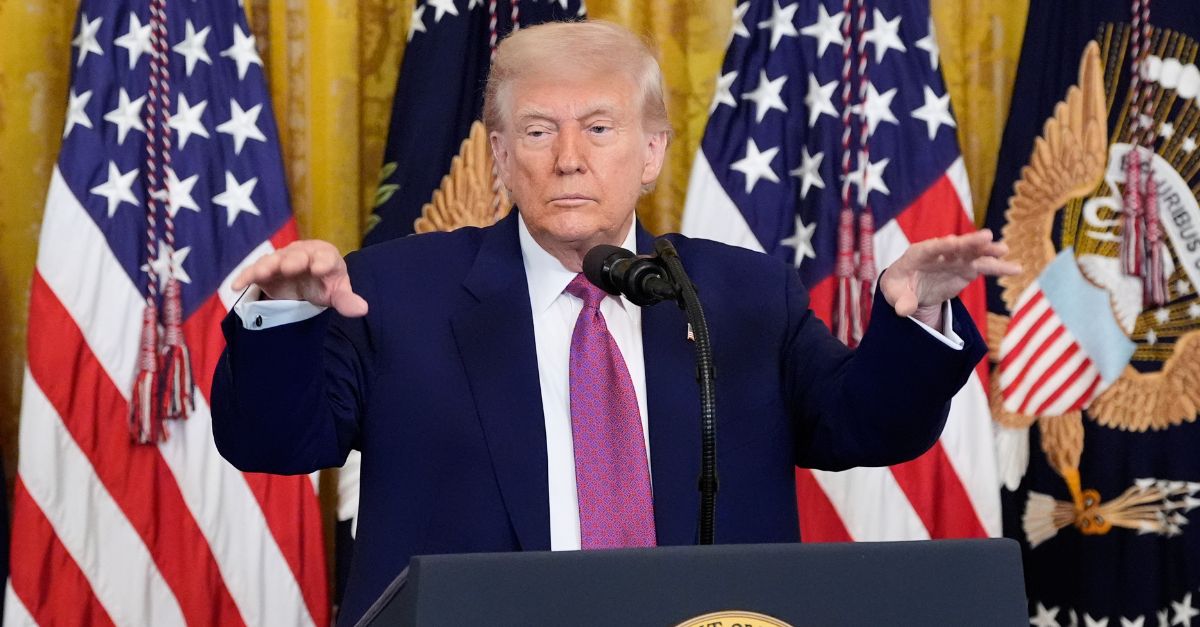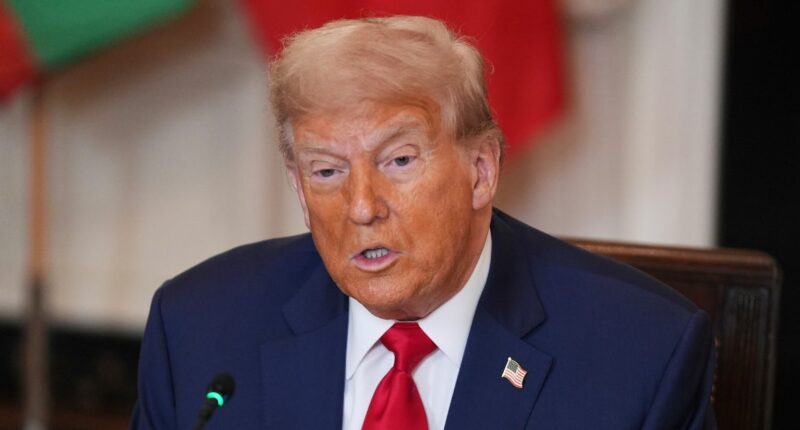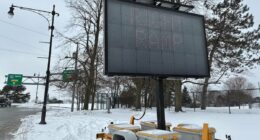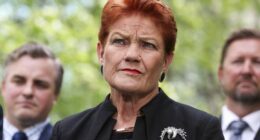Share this @internewscast.com
President Donald Trump addresses attendees during a luncheon with African leaders in the State Dining Room of the White House, on Wednesday, July 9, 2025, in Washington (AP Photo/Evan Vucci).
An organization dedicated to public interest law is asking a federal court of appeals to support a business coalition in their legal challenge against President Donald Trump regarding the administration’s emergency tariffs.
In a 35-page amicus brief submitted on Tuesday, the New Civil Liberties Alliance (NCLA) argues that all tariffs implemented this year contravene federal law. The NCLA is urging the U.S. Court of Appeals for the Federal Circuit to uphold the Court of International Trade’s previous decision on this matter—and beyond.
“This Court should not merely affirm the decision by the Court of International Trade; rather, it should issue an even stronger opinion unreservedly holding that any tariffs imposed through the International Emergency Economic Powers Act (IEEPA) are unlawful, as it is not a statute that provides for tariffs,” the motion begins.
The friend of the court brief argues that there are several avenues by which the appeals court can reach that conclusion.
Love true crime? Sign up for our newsletter, The Law&Crime Docket, to get the latest real-life crime stories delivered right to your inbox.
Throughout the past few months, the 45th and 47th president has issued a series of controversial tariffs — many of which have since been scaled back — largely under the authority of the IEEPA.
In mid-April, V.O.S. Selections, an alcohol importer, along with other businesses, filed a lawsuit against the tariffs regime – alleging general tumult with pricing, shipping, product selection, inventory levels, reduction in cash flow, and reduction in purchase orders. In late April, a coalition of 12 Democratic Party-led states filed a separate and similar challenge to Trump’s tariffs. The cases were later consolidated.
In late May, the consolidated plaintiffs won the argument – securing a formal kibosh on the tariffs by a unanimous three-judge panel sitting in New York City. But in real terms, that ruling was immediately stayed by a 10-judge panel on the appellate court.
To hear the amici tell it, the IEEPA – which the Trump administration has relied upon for most of its authority to impose tariffs – simply does not do what the government says it does.
The Tuesday filing argues that “the plain meaning of the statute does not provide for tariffs” and “such a reading ends the matter.”
In the case, the dispute hinges upon a section of the statute authorizing the president to “investigate, block during the pendency of an investigation, regulate, direct and compel, nullify, void, prevent or prohibit, any acquisition, holding, withholding, use, transfer, withdrawal, transportation, importation or exportation…”
In motions practice, and prior court rulings, the relevant phrase is often rendered: “regulate…importation.”
The NCLA wants the court to read the statute as written.
“Congress did not understand ‘regulate…importation’ to authorize any tariffs in the first place,” the motion argues. “IEEPA, as plaintiffs-appellees note, does not mention ‘tariffs’ at all. So, the idea that IEEPA cannot be construed to allow tariffs, and must instead be construed according to its plain meaning, makes perfect sense—and is the most logical way to construe the statutory language.”
The filing goes on like this, at length:
Fundamentally, IEEPA provides for sanctions, asset freezes, and other forms of regulation—it does not provide for tariffs. The text of IEEPA does not use the word “tariffs,” the Constitution treats tariffs differently, and tariff-related portions are found in other sections of the United States Code. Given all this, it is unsurprising that one federal district court has already decided that IEEPA does not authorize tariffs at all— so that a challenge to executive orders invoking IEEPA can be resolved by a federal district court.
‘This unlawful impost must fall’: Conservative group sues Trump claiming tariffs are ‘unconstitutional exercise of legislative power’
The Trump administration says it’s not that plain and simple.
In the case, the U.S. Department of Justice says the IEEPA’s “predecessor” statute is the Trading With the Enemy Act (TWEA). And prior use of that statute, by President Richard Nixon, is instructive, if not dispositive in Trump’s favor, the government claims.
“In 1971, President Nixon invoked TWEA during peacetime to impose tariffs,” the DOJ argued in an earlier filing. “Specifically, he ‘declared a national emergency with respect to the balance-of-payments crisis and under that emergency imposed a surcharge on imports.’ The Federal Circuit’s predecessor upheld the lawfulness of President Nixon’s TWEA tariffs. After President Nixon invoked TWEA to impose tariffs, Congress passed two new laws modifying the President’s use of emergency powers: the National Emergencies Act and IEEPA.”
But the NCLA has marshaled a predecessor as well.

President Donald Trump speaks after signing a bill blocking California’s rule banning the sale of new gas-powered cars by 2035, in the East Room of the White House, Thursday, June 12, 2025, in Washington (AP Photo/Alex Brandon).
The filing argues the Court of Customs and Patent Appeals – which was an earlier iteration of the Federal Circuit – in the Nixon case “construed” the TWEA phrase “regulate importation” to have “a different meaning than how similar language” is used in the IEEPA.
Here, the amicus brief acknowledges it is on less firm territory but essays the well-trod legal theory of constitutional avoidance – the idea that a statute that would otherwise be unconstitutional is, in fact, someway limited so as to be constitutionally acceptable.
The NCLA, for its part, says the IEEPA “does not limit any authority that it grants.” This, the group says, stands in stark contrast to the Court of Customs and Patent Appeals ruling – which did find limits to Nixon’s tariff-setting authority in that aforementioned case.
“Because no such necessary limitations exist here, and because, were the courts to accept the defendants-appellants’ argument, no such limitations can be read into the IEEPA statute, there is no way to construe IEEPA’s text that is simultaneously constitutionally permissible and that permits the executive to impose tariffs,” the amicus brief argues.
The brief goes on to accuse Trump of not only purporting to give himself “unlimited tariff authority” – but attempting to go beyond an already-established framework of tariff rates set by Congress.
“President Trump is not acting — as the Court of Customs and Patent Appeals said that President Nixon did — in the intermediate twilight zone of Executive authority,” the brief goes on. “Instead, President Trump is acting against the will of Congress as expressed in statute, so he is acting at the nadir of his constitutional powers.”
The NCLA sticks with the earlier case for its final argument – an easy-to-understand assertion that “the facts in this case are so divorced in nature” from the Nixon TWEA case that the DOJ’s current arguments should not be accepted even if the appellate court were to use “the reasoning used by the court in that case.”

















